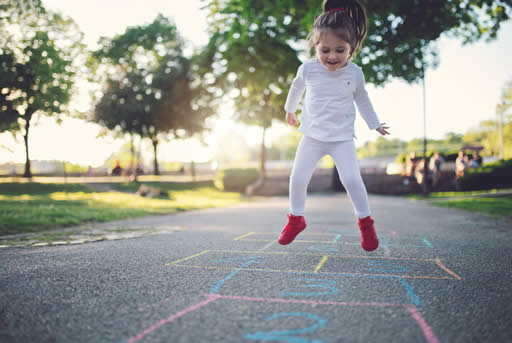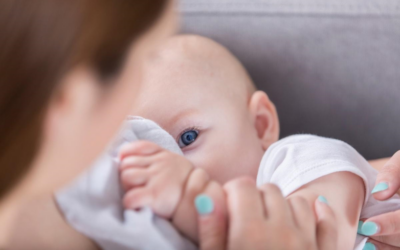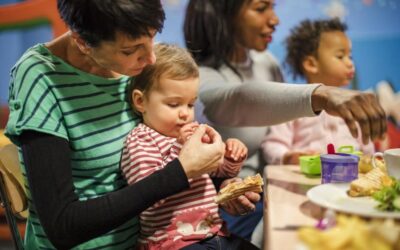Incorporate play-based activities that encourage gross motor skill development
Children benefit from brain growth, physical development, social skills, and a sense of self through active play, making it more essential to learning than just plain old having fun – which is also important.
Playing is a core ingredient to developing gross motor skills, which evolve over time and help children develop muscular strength, hand-eye coordination, awareness of objects around them, and balance. Encouraging physical play throughout infancy and early childhood promotes good health and helps children build a connection to their bodies, their peers, and the world around them.
The development of gross motor skills begins in infancy as babies explore their surroundings and learn to roll over, sit up, crawl, physically interact with objects, and manipulate toys. Parents can encourage this early growth by providing adequate room for a safe play area and engaging in activities that encourage grabbing, reaching, or moving.
There are many different options for gross motor skill activities. Incorporate the following concepts into your caregiving routine:
Musical play
Music inspires movement, even in babies. Experiment with different tempos, provide simple instruments, participate in singalongs, do the Hokey Pokey, and throw dance parties. Musical activities can be tailored to work for many different age groups and phases of development.
Proper toys
The downside of digital toys is that they often fail to encourage exploration. Choose play items that involve more than just pushing a button. Stacking rings, building blocks, balls, and other items that require physical manipulation are entertaining while also providing the opportunity to develop gross motor skills.
Swings, scooters, tricycles, and ride-on toys are also good options, as they help children learn to process movement sensations The sensations provide information regarding movement and balance by telling the brain where the head is and how the body is moving through space, making it an essential component of motor skill mastery.
Body-focused
Understanding body awareness – where your body is, how it moves, and its relation to other items – is an important motor skill trait. Exploring an obstacle course with objects to move over, under, through, and around can help develop both spatial awareness and body awareness, as can games like Simon Says or mimicking the posture and movements of different animals.
The two biggest influences on gross motor skills in early childhood are actually the easiest to provide – time and space. Children have a natural inclination to move and explore. Provide a safe, open area and incorporate a wide range of fun physical activities into your daily routine so that gross motor skills can develop in an enriching and organic way. The VA Infant & Toddler Network helps improve the quality of care for infants and toddlers through extensive resources, services, and education for caregivers. Learn more about how we can help you improve the standard of care.




